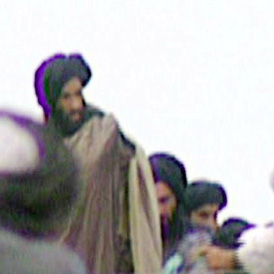Mullah Omar statement ignites hopes for Taliban negotiations
As the Taliban leader issues a statement to mark the end of Ramadan, Channel 4 News’ Head of Foreign News Ben De Pear examines whether it may be finally possible to talk with the Taliban.

For the first time, Mullah Omar has not flatly rejected any hope of negotiations with Nato whilst western troops remain in Afghanistan.
Mullah Omar’s Eid statements are the reclusive Taliban leader’s only direct message to the world and are thus closely read for any indications of what direction the insurgency might be taking.
This shift will provide some succour to exhaustive efforts to talk peace with the Taliban, especially after recent setbacks in the limited direct contacts which have taken place.
Efforts for the US to talk directly to the Taliban were for years stymied by the US administration’s reluctance to do so, but whilst that policy has changed in the past year, Pakistan has repeatedly tried to prevent talks occurring without it either hosting or controlling them.
After a now traditional preamble where the one-eyed leader laid out the unprecedented successes of the insurgency and the numbers of coalition troops killed, there was a surprising concession when he described the group’s ultimate aim of establishing an Islamic emirate in Afghanistan.
“For this purpose, every legitimate option can be considered in order to reach this goal.
“The contacts which have been made with some parties for the release of prisoners can’t be called as a comprehensive negotiation for the solution of the current imbroglio of the country.”
There are few other positives for the US or Britain to take from his statement.
Obama’s drawdown of troop numbers is taken as a sign of weakness and defeat. The recent downing of helicopters and the geographic widening of attacks is lauded by Mullah Omar as a sign of the Taliban’s increasing strength.
Mullah Omar has repeated his criticism of the coalition of nations fighting in Afghanistan for failing to leave any major legacy of infrastructure or development in the impoverished country, something he says the Taliban would reverse if they ruled the country.
However the statement can be seen as an acceptance, mirroring Nato’s own assessment, that after almost a decade of escalating western military involvement, there is a bloody stalemate which can only be broken by negotiation.
But talks with an organisation such as the Taliban have been years in the making and have not progressed much beyond talks about talks.
As well as the Taliban, the US, the Afghan government, Pakistan and other Nato governments, there are others with much to gain or lose in Afghanistan.
Iran, Saudi Arabia, India and Turkey also influence the sensitive diplomatic dance, but negotiators have told me that Pakistan’s involvement has been the most disruptive to direct talks.
“All interested parties come and sit around the table with their cards to play,” a source central to the establishment of the first talks between regional powers three years ago in Mecca told me.
“But the Pakistanis come with multiple hands of cards and multiple agendas.”
And for an insurgent organisation hunted down in the past 12 months by Nato special forces like never before, and hiding in some of the most hostile and remote territory in the world, communications are far from easy.
A senior western diplomatic source told me that intelligence sources believe Mullah Omar rarely, if ever, meets with other Taliban leaders, or the Quetta Shura as it is known.
When the Shura meets to debate strategy and decisions it writes lengthy minutes and proposals for action which are couriered to Mullah Omar in hiding.
He reads all points of view and then dictates lengthy and considered decisions which become policy decrees, and which are then sent back to the Shura.
It’s hardly speedy or risk-free decision making.
Afghan MP Homa Sultani recently appealed to President Karzai on behalf of Mullah Omar, after claiming she met him at her Kabul home where they allegedly discussed striking a peace deal.
But while her comments were mostly scorned, she may have been telling a more general truth: that after years of uncertainty, obstinance and belligerent resistance, there may finally be a way of talking to the Taliban.
